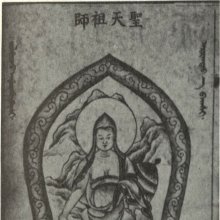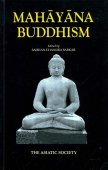Aryadeva, Āryadeva: 11 definitions
Introduction:
Aryadeva means something in Buddhism, Pali, Hinduism, Sanskrit, the history of ancient India. If you want to know the exact meaning, history, etymology or English translation of this term then check out the descriptions on this page. Add your comment or reference to a book if you want to contribute to this summary article.
Images (photo gallery)
In Buddhism
Tibetan Buddhism (Vajrayana or tantric Buddhism)
Source: Google Books: Mahāmudrā and Related InstructionsĀryadeva (आर्यदेव) is the name of an ancient teacher belonging to the “lineage of the profound view”, according to “the succession of Gurus in the Mahāmudrā lineages” in the Kagyü School of Tibetan Buddhism (the Mahāmudrā deals with the nature of the mind).—The graduated path of the three levels of beings, which is an adornment [for the Mahāmudrā], is of three lineages: 1. The lineage of vast conduct; 2. The lineage of the profound view; 3. The lineage of the blessing of practice.—[The lineage of vast conduct]—(1) The perfect Buddha,... (4) Āryadeva,... and (8) Atiśa.
Source: Wisdomlib Libary: VajrayanaĀryadeva or Karnaripa is the name of a mahāsiddha, of which eighty-four in total are recognized in Vajrayāna (tantric buddhism). His title is “the one-eyed”. He lived somewhere between the 8th and the 12th century AD.
These mahāsiddhas (e.g., Āryadeva) are defined according to the Abhayadatta Sri (possibly Abhayākaragupta) tradition. Its textual origin traces to the 11th century caturāsiti-siddha-pravṛtti, or “the lives of the eighty-four siddhas”, of which only Tibetan translations remains. Āryadeva (and other Mahāsiddhas) are the ancient propounders of the textual tradition of tantric or Vajrayana Buddhism.

Tibetan Buddhism includes schools such as Nyingma, Kadampa, Kagyu and Gelug. Their primary canon of literature is divided in two broad categories: The Kangyur, which consists of Buddha’s words, and the Tengyur, which includes commentaries from various sources. Esotericism and tantra techniques (vajrayāna) are collected indepently.
Mahayana (major branch of Buddhism)
Source: Wisdom Library: Maha Prajnaparamita SastraĀryadeva (आर्यदेव), Nāgārjuna and Rāhulabhadra represent the first lineage of Madhyamika scholars. Their biographies are legendary and their dates uncertain. Not content with giving us contradictory information on them, the sources confuse them with the siddhas of the same name who were present at Nalandā several centuries later.
The Indians, Chinese and Tibetans agree in making Āryadeva the pupil of Nāgārjuna. At the beginning of his commentary on the Catuḥśataka, Candrakīrti (c. 600–650 C.E.) tells us: “Āryadeva was born in the island of Siṃhala (Ceylon) and was the son of the king of the land. After having been crown prince, he renounced the world, went to Dakṣiṇa (Dekkan), became a disciple of Nāgārjuna and followed his teachings”.
Source: Mandala Texts: Āryadeva’s Measure of What Is at HandĀryadeva (आर्यदेव) is the name of a Mahāyāna master who lived in the 3rd century CE and was the chief disciple of Nāgārjuna, founder of the Middle Way (madhyāmaka) school. [...] Āryadeva composed a number of treatises for this school, the most famous being, The Four Hundred Stanzas (चतुःशतकशास्त्तकारिका (Catuḥśatakaśāsttakārikā), བསྟན་བཅོས་བཞི་བརྒྱ་པ་ཞེས་བྱ་བའི་ཚིག་ལེའུར་བྱས་པ་).

Mahayana (महायान, mahāyāna) is a major branch of Buddhism focusing on the path of a Bodhisattva (spiritual aspirants/ enlightened beings). Extant literature is vast and primarely composed in the Sanskrit language. There are many sūtras of which some of the earliest are the various Prajñāpāramitā sūtras.
General definition (in Buddhism)
Source: academia.edu: The Chronological History of Buddhism1) Aryadeva or Bodhisattva Deva or Kanadeva (1070-990 BCE).—Aryadeva was the son of a Simhalese (Sri Lankan) king Panchashringa. He learnt Tripitaka from Hemadeva in Simhala. He went to Sriparvata (Nagarjunakonda) in Andhra and met Nagarjuna II. Aryadeva authored many Madhyamika texts. He wrote Chatussataka-Shastra-nama-Karika. He went to Nalanda and impressed upon Matricheta to accept Buddhism. Buddhist monk Tathagatabhadra or Nagahvaya was his contemporary.
2) Aryadeva II (910-830 BCE) It appears that the second Aryadeva existed during the time of Sthiramati and Dingnaga. Most probably, he was the contemporary of Sthiramati and Dingnaga.
India history and geography
Source: academia.edu: The Chronological History of Tibetan BuddhismAryadeva (11th century BCE).—Though Buddhism was introduced in Tibet during the time of Samantabhadra (16th century BCE) but Acharya Vetalakshema [Garab Dorje] (1321-1221 BCE) was the first teacher of Tibetan Buddhism. It appears that early Tibetan Buddhists followed Indian Buddhist scholars like Aryadeva.

The history of India traces the identification of countries, villages, towns and other regions of India, as well as mythology, zoology, royal dynasties, rulers, tribes, local festivities and traditions and regional languages. Ancient India enjoyed religious freedom and encourages the path of Dharma, a concept common to Buddhism, Hinduism, and Jainism.
Languages of India and abroad
Sanskrit dictionary
Source: Cologne Digital Sanskrit Dictionaries: Edgerton Buddhist Hybrid Sanskrit DictionaryĀryadeva (आर्यदेव).—name of a teacher: Mahāvyutpatti 3476.
Source: Cologne Digital Sanskrit Dictionaries: Aufrecht Catalogus CatalogorumĀryadeva (आर्यदेव) as mentioned in Aufrecht’s Catalogus Catalogorum:—poet. [Subhāshitāvali by Vallabhadeva]
Source: Cologne Digital Sanskrit Dictionaries: Monier-Williams Sanskrit-English DictionaryĀryadeva (आर्यदेव):—[=ārya-deva] [from ārya] m. Name of a pupil of Nāgārjuna.
[Sanskrit to German]
Sanskrit, also spelled संस्कृतम् (saṃskṛtam), is an ancient language of India commonly seen as the grandmother of the Indo-European language family (even English!). Closely allied with Prakrit and Pali, Sanskrit is more exhaustive in both grammar and terms and has the most extensive collection of literature in the world, greatly surpassing its sister-languages Greek and Latin.
See also (Relevant definitions)
Partial matches: Deva, Arya, Teva.
Ends with: Acaryadeva, Acharyadeva, Caryadeva.
Full-text: Nagarjuna, Candrakirti, Rahulabhadra, Catuhshataka, Karnaripa, Matriceta, Prasada, Bhugriha, Bhumigriha, Samskritya, Dhyanasamuccaya, Abhisamskritya, Siddhisamuccaya, Amnaya, Samuccaya, Abhidhamma.
Relevant text
Search found 22 books and stories containing Aryadeva, Āryadeva, Arya-deva, Ārya-deva; (plurals include: Aryadevas, Āryadevas, devas). You can also click to the full overview containing English textual excerpts. Below are direct links for the most relevant articles:
Maha Prajnaparamita Sastra (by Gelongma Karma Migme Chödrön)
Appendix 8 - The Catuḥśataka (the four hundreds) by Āryadeva < [Chapter XXXVI - The eight recollections (anusmṛti or anussati)]
Appendix 9 - The first Madhyamika authors (Nāgārjuna, Āryadeva, Rāhulabhadra) < [Chapter XXXVI - The eight recollections (anusmṛti or anussati)]
II. Metonymical meaning of kuśalamūla (‘roots of good’) < [Part 1 - Honoring all the Buddhas]
Buddha-nature (as Depicted in the Lankavatara-sutra) (by Nguyen Dac Sy)
1.1. Āryadeva and His Works < [Chapter 3 - The Laṅkāvatārasūtra and Hindu Philosophy]
Introduction to the Laṅkāvatāra-sūtra < [Introduction]
Introduction (Hīnayāna and Hindu philosophy) < [Chapter 3 - The Laṅkāvatārasūtra and Hindu Philosophy]
Mahayana Buddhism and Early Advaita Vedanta (Study) (by Asokan N.)
Chapter 4.1 - Reality in Madhyamika (a): Void the Absolute
Chapter 5.7 - Madhyamika Interpretation of Dependent Origination
Bodhisattvacharyavatara (by Andreas Kretschmar)
Text Section 183 < [Khenpo Chöga’s Oral Explanations]
Text Section 40 < [Khenpo Chöga’s Oral Explanations]
Text Section 221 / Stanza 8 < [Khenpo Chöga’s Oral Explanations]
The Indian Buddhist Iconography (by Benoytosh Bhattachacharyya)
Blue Annals (deb-ther sngon-po) (by George N. Roerich)
Chapter 11 - Drigung Chojay lineage (v): 'gar dam pa chos sdings pa < [Book 8 - The famous Dakpo Kagyü (traditions)]
Chapter 8 - Later Lineages (viii): The dri med phra tig < [Book 12 - Peace-Making Lineages]
Chapter 2 - Guhyasamāja-tantra system of Noble Nāgārjuna < [Book 7 - The preaching of the Tantras]
Related products

.jpg)

